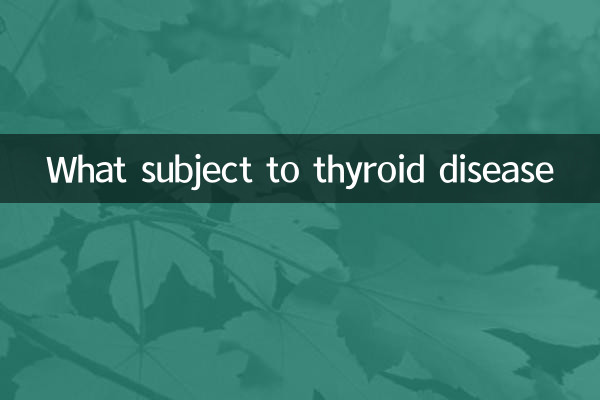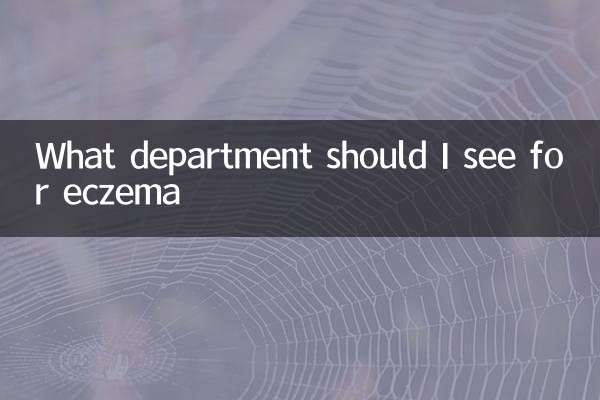What department should I see for thyroid disease? Comprehensive analysis of medical treatment guidelines and hot topics
In recent years, the incidence of thyroid disease has increased year by year, becoming a health hotspot of public concern. When many patients first develop symptoms, they often don’t know which department to call. This article will combine the hot topics on the Internet in the past 10 days to sort out the medical treatment guide for thyroid diseases for you, and attach structured data to help you quickly obtain key information.
1. Common types and symptoms of thyroid disease

Thyroid diseases mainly include hyperthyroidism (hyperthyroidism), hypothyroidism (hypothyroidism), thyroid nodules, thyroiditis and thyroid cancer. The following is a comparison of common symptoms:
| disease type | Typical symptoms |
|---|---|
| Hyperthyroidism | Palpitations, sweating, weight loss, hand tremors |
| Hypothyroidism | Fatigue, sensitivity to cold, weight gain, memory loss |
| Thyroid nodules | Neck mass and swallowing discomfort (mostly asymptomatic) |
| Thyroid cancer | Rapid enlargement of nodules, hoarseness, and swollen lymph nodes |
2. Which department should I treat thyroid disease?
According to the type of disease and stage of diagnosis and treatment, the recommended departments for treatment are as follows:
| Medical treatment stage | Recommended departments | illustrate |
|---|---|---|
| First visit screening | Endocrinology | Responsible for the diagnosis and drug treatment of thyroid dysfunction |
| Nodule/tumor assessment | Thyroid surgery | Specializing in thyroid surgery and tumor treatment |
| Ultrasound examination | Diagnostic Ultrasound Department | Make a preliminary judgment on the nature of the nodule |
| radiation therapy | Department of Nuclear Medicine | Radioactive iodine treatment for hyperthyroidism or thyroid cancer |
3. Recent hot topics on thyroid disease across the Internet (last 10 days)
Combining social media and medical platform data, the following topics are the most discussed:
| Ranking | hot topics | focus of discussion |
|---|---|---|
| 1 | Can thyroid nodules become cancerous? | Differentiation criteria for benign and malignant nodules |
| 2 | Does Euthyrox need to be taken for life? | Medication confusion among patients with hypothyroidism |
| 3 | Thyroid cancer is getting younger | Reasons for the increasing incidence rate among 20-40 year olds |
| 4 | The relationship between iodized salt and thyroid disease | Is a low-iodine diet needed in coastal areas? |
4. Preparations before treatment
In order to improve the efficiency of diagnosis and treatment, it is recommended that patients make the following preparations in advance:
1.Organize medical history: Record the time of symptom onset and family history of thyroid disease;
2.Bring inspection report: If there are previous thyroid ultrasound and thyroid function blood test results;
3.Make a medication list: Including health products and traditional Chinese medicine;
4.Prepare a list of questions: Such as whether any taboos are required, review period, etc.
5. Special reminder
If the following emergencies occur, please seek medical attention immediately:
• Severe pain in the thyroid area with fever (possible acute thyroiditis)
• Patients with hyperthyroidism develop high fever and heart rate >140 beats/min (be wary of hyperthyroidism crisis)
• Thyroid nodules rapidly enlarge in a short period of time and compress the trachea
Through the structured data in this article, I believe you have a clear understanding of the department selection for thyroid disease. Early detection, early diagnosis, and early treatment are the keys to dealing with thyroid disease. It is recommended that high-risk groups (such as those with a family history or chronic stress) undergo thyroid ultrasound and functional testing once a year.

check the details

check the details